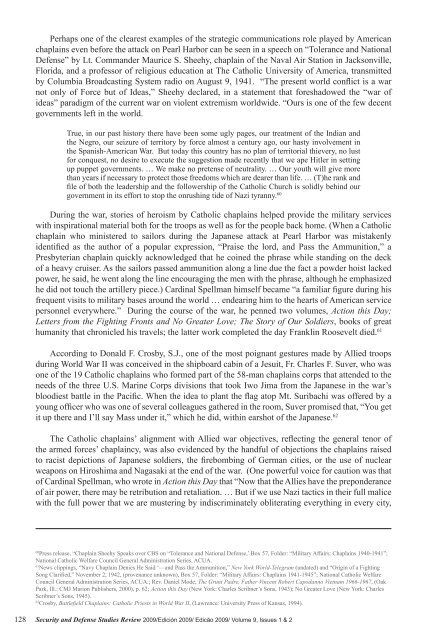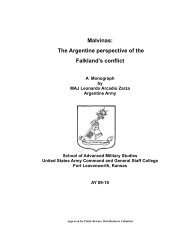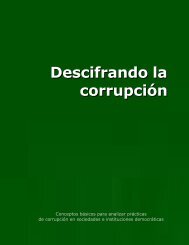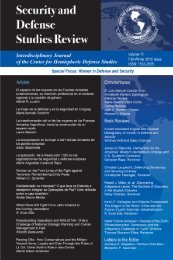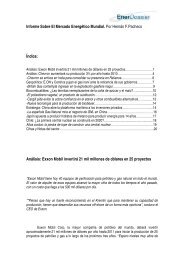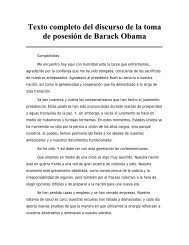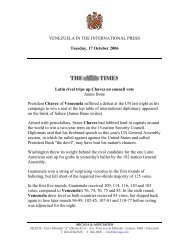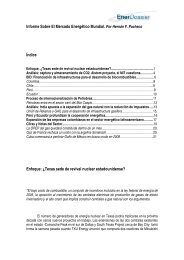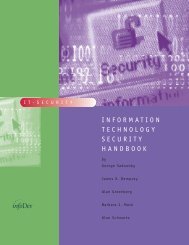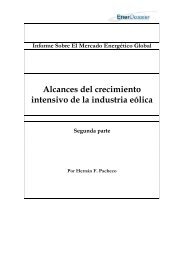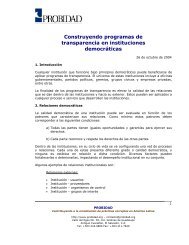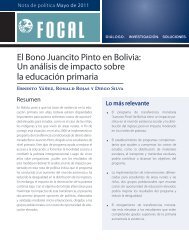Perhaps one of the clearest examples of the strategic communications role played by Americanchaplains even before the attack on Pearl Harbor can be seen in a speech on “Tolerance <strong>and</strong> National<strong>Defense</strong>” by Lt. Comm<strong>and</strong>er Maurice S. Sheehy, chaplain of the Naval Air Station in Jacksonville,Florida, <strong>and</strong> a professor of religious education at The Catholic University of America, transmittedby Columbia Broadcasting System radio on August 9, 1941. “The present world conflict is a warnot only of Force but of Ideas,” Sheehy declared, in a statement that foreshadowed the “war ofideas” paradigm of the current war on violent extremism worldwide. “Ours is one of the few decentgovernments left in the world.True, in our past history there have been some ugly pages, our treatment of the Indian <strong>and</strong>the Negro, our seizure of territory by force almost a century ago, our hasty involvement inthe Spanish-American War. But today this country has no plan of territorial thievery, no lustfor conquest, no desire to execute the suggestion made recently that we ape Hitler in settingup puppet governments. … We make no pretense of neutrality. … Our youth will give morethan years if necessary to protect those freedoms which are dearer than life. … (T)he rank <strong>and</strong>file of both the leadership <strong>and</strong> the followership of the Catholic Church is solidly behind ourgovernment in its effort to stop the onrushing tide of Nazi tyranny. 60During the war, stories of heroism by Catholic chaplains helped provide the military serviceswith inspirational material both for the troops as well as for the people back home. (When a Catholicchaplain who ministered to sailors during the Japanese attack at Pearl Harbor was mistakenlyidentified as the author of a popular expression, “Praise the lord, <strong>and</strong> Pass the Ammunition,” aPresbyterian chaplain quickly acknowledged that he coined the phrase while st<strong>and</strong>ing on the deckof a heavy cruiser. As the sailors passed ammunition along a line due the fact a powder hoist lackedpower, he said, he went along the line encouraging the men with the phrase, although he emphasizedhe did not touch the artillery piece.) Cardinal Spellman himself became “a familiar figure during hisfrequent visits to military bases around the world … endearing him to the hearts of American servicepersonnel everywhere.” During the course of the war, he penned two volumes, Action this Day;Letters from the Fighting Fronts <strong>and</strong> No Greater Love; The Story of Our Soldiers, books of greathumanity that chronicled his travels; the latter work completed the day Franklin Roosevelt died. 61According to Donald F. Crosby, S.J., one of the most poignant gestures made by Allied troopsduring World War II was conceived in the shipboard cabin of a Jesuit, Fr. Charles F. Suver, who wasone of the 19 Catholic chaplains who formed part of the 58-man chaplains corps that attended to theneeds of the three U.S. Marine Corps divisions that took Iwo Jima from the Japanese in the war’sbloodiest battle in the Pacific. When the idea to plant the flag atop Mt. Suribachi was offered by ayoung officer who was one of several colleagues gathered in the room, Suver promised that, “You getit up there <strong>and</strong> I’ll say Mass under it,” which he did, within earshot of the Japanese. 62The Catholic chaplains’ alignment with Allied war objectives, reflecting the general tenor ofthe armed forces’ chaplaincy, was also evidenced by the h<strong>and</strong>ful of objections the chaplains raisedto racist depictions of Japanese soldiers, the firebombing of German cities, or the use of nuclearweapons on Hiroshima <strong>and</strong> Nagasaki at the end of the war. (One powerful voice for caution was thatof Cardinal Spellman, who wrote in Action this Day that “Now that the Allies have the preponderanceof air power, there may be retribution <strong>and</strong> retaliation. … But if we use Nazi tactics in their full malicewith the full power that we are mustering by indiscriminately obliterating everything in every city,60Press release, “Chaplain Sheehy Speaks over CBS on “Tolerance <strong>and</strong> National <strong>Defense</strong>,’ Box 57, Folder: “Military Affairs: Chaplains 1940-1941”;National Catholic Welfare Council General Administration Series, ACUA.61News clippings, “Navy Chaplain Denies He Said ‘—<strong>and</strong> Pass the Ammunition,” New York World-Telegram (undated) <strong>and</strong> “Origin of a FightingSong Clarified,” November 2, 1942, (provenance unknown), Box 57, Folder: “Military Affairs: Chaplains 1941-1945”; National Catholic WelfareCouncil General Administration Series, ACUA.; Rev. Daniel Mode, The Grunt Padre, Father Vincent Robert Capodanno Vietnam 1966-1967, (OakPark, Ill.: CMJ Marion Publishers, 2000), p. 62; Action this Day (New York: Charles Scribner’s Sons, 1943); No Greater Love (New York: CharlesScribner’s Sons, 1945).62Crosby, Battlefield Chaplains: Catholic Priests in World War II, (Lawrence: University Press of Kansas, 1994).128<strong>Security</strong> <strong>and</strong> <strong>Defense</strong> <strong>Studies</strong> <strong>Review</strong> 2009/Edición 2009/ Edicão 2009/ Volume 9, Issues 1 & 2
we are bound to suffer ourselves. … Let us win the war without destroying our victory.”) At the sametime, Catholic chaplains were known for their zealous vigilance of GI sexual practices, including theuse of prophylactics. 63From the time the U.S. was attacked at Pearl Harbor to Japan’s surrender aboard the battleship USSMissouri September 2, 1945, nine percent of the American Catholic clergy served as commissionedchaplains—2,453 in the Army <strong>and</strong> 817 in the Navy—a number that does not include the nearly2,000 civilian auxiliary chaplains laboring under the auspices of the Military Ordinate. Seventy-sixchaplains died while on active duty <strong>and</strong> 832 received decorations <strong>and</strong> citations for bravery. 64Military Chaplains as Strategic Communicators in U.S. Army Character Education Program(1947-1977)In the U.S. military, character was considered to be the foremost of the “important <strong>and</strong> manifold”personal qualifications that created leaders. Brig. General Edward L. King, comm<strong>and</strong>ant of theGeneral Service Schools in Leavenworth, Kansas, said in a speech in the aftermath of World War I,that character “possesses vigor <strong>and</strong> strength.And a leader, whether he leads a pack of dogs or a company of men must evidence that hepossesses it. A leader who gives orders <strong>and</strong> allows them to be disobeyed is soon despisedby his comm<strong>and</strong>, because the comm<strong>and</strong>, like a pack of wild dogs, instinctively dem<strong>and</strong>s thequality in their leader, which is needed for the safety of the pack or for the well-being of thecomm<strong>and</strong> … An army is happy under a strong leader, but not under a soviet committee. 65In the aftermath of World War II, like other Americans, military chaplains sought to adjust topeacetime circumstances even as the chill of the Cold War was beginning to create pallor over thepeace. A retired Presbyterian Navy chaplain “who apparently knows hundreds of people in keyplaces in the Government” sounded out the U.S. Catholic Church authorities about setting up anorganization to be called the “United Nations Chaplains’ League.” The proposal, which wouldhave taken chaplains down a new strategic communications path, was meant “to weld together thechaplains of all countries into a unit for the exchange of ideas <strong>and</strong> to combat subversive activities.”Its secular purpose was reflected in its proposal for membership, as the “(b)asis for cooperation is tobe merely a belief in the natural law, without any other theological overtones.” 66Closer to home, in 1947, the U.S. Army embarked upon program of character education. Thecourse reflected current thinking about religion <strong>and</strong> personal morality as key elements of training.Its “national preparedness ideology” formed part of an emerging national security system that tookits global responsibility as a shared enterprise between civilian <strong>and</strong> military spheres of life that wasinexorably tied to the United States’ “moral power,” the boundaries between them which appearedincreasingly tenuous. 67 The program reflected the view of President Harry S Truman <strong>and</strong> othersthat “the spiritual <strong>and</strong> moral health of the Armed Forces is a vital element in our national security.Together with a universal underst<strong>and</strong>ing of the principles of citizenship <strong>and</strong> American democracy, itconstitutes the bedrock on which security <strong>and</strong> the success of military preparedness depend.” 68The Character Guidance effort grew out of an experiment at Fort Knox, Kentucky, which as partof 40-hour weekly basic military training, moral, religious <strong>and</strong> citizenship lessons were offered bythree chaplains in the form of 50-minute lectures. The program, although a comm<strong>and</strong> responsibility,63Spellman, op. cit., p. 75.64http://www.milarch.org/history/index.html; Mode, The Grunt Padre, op. cit.65“Leadership: A Resume of a Lecture by General Edward L. King, January 4, 1926,” The Chaplains’ School Class Bulletin, Twelfth Session, FortLeavenworth, Kansas, March Twelfth, 1926.” Box 57, Folder: “Military Affairs: Chaplains’ Conference, 1926-1940;” ACUA, op. cit.66Memor<strong>and</strong>um to Father Kenny, from W.C. Smith, re: “Chaplains of the United Nations,” November 22, 1946;” Box 57, Folder: “Military Affairs:Chaplains, 1945-1950;” ACUA.67Lovel<strong>and</strong>, “Character Education in the U.S. Army, 1847-1977,” Journal of Military History, Vol. 64, No. 3 (July, 2000), pp. 801-803.68Truman, “Statement by the President Making Public a Report on Moral Safeguards for Selective Service Trainees, September 16, 1948,” p. 488.<strong>Security</strong> <strong>and</strong> <strong>Defense</strong> <strong>Studies</strong> <strong>Review</strong> 2009/Edición 2009/ Edicão 2009/ Volume 9, Issues 1 & 2 129
- Page 4 and 5:
Document: Speech on “Security, In
- Page 6 and 7:
6Security and Defense Studies Revie
- Page 8 and 9:
un tema de seguridad y defensa porq
- Page 10 and 11:
Los Intereses de la República Popu
- Page 12 and 13:
En el marco estratégico descrito e
- Page 14 and 15:
Works (FAW), Geeley, Dongfeng, y Ch
- Page 16 and 17:
interés en participar en el yacimi
- Page 18 and 19:
al emplear personas locales en todo
- Page 20 and 21:
había un banco en Colombia especia
- Page 22 and 23:
ehén de los FARC, escribe de siete
- Page 24 and 25:
estadounidenses en el futuro, y por
- Page 26 and 27:
26Security and Defense Studies Revi
- Page 28 and 29:
Existe numerosa literatura que trat
- Page 30 and 31:
La Tabla 1.1, demuestra que el apor
- Page 32:
Los cuestionamiento a este modelo d
- Page 35 and 36:
….derogaremos la Ley del Cobre y
- Page 37 and 38:
Figura 4.3.Aporte de CODELCO por ve
- Page 39:
Figura 6.Elaboración propia distri
- Page 42 and 43:
de los proyectos de defensa necesit
- Page 44 and 45:
En el caso de las inversiones en de
- Page 46 and 47:
Anexo 1PROTOCOLO DE ACUERDO QUE ACO
- Page 48 and 49:
OECD. “Models of Public Budgeting
- Page 50 and 51:
proyectos nacionales y democrático
- Page 52 and 53:
DesprofesionalizaciónEn la región
- Page 54 and 55:
Según algunos autores, “no sorpr
- Page 56 and 57:
(antinarcóticos), la Guardia Coste
- Page 58 and 59:
supervigilen las acciones intrusiva
- Page 60 and 61:
Quizás una de las fallas provenga
- Page 62 and 63:
Junto con ello se elaboró una nuev
- Page 64 and 65:
Colombia). Por otro, hay una serie
- Page 66 and 67:
Maldonado, Carlos, “Profesionalis
- Page 68 and 69:
policías y militares no ha estado
- Page 70:
La relación entre fuerzas militare
- Page 73 and 74:
dictaduras. En aquellos con más tr
- Page 75 and 76:
efectos de planificación se ha hab
- Page 77 and 78: BibliografíaAguila, Ernesto y Mald
- Page 79 and 80: Sherman, Lawrence. et.al. 1973. Tea
- Page 81: Influenza Pandemic and its National
- Page 84 and 85: and restaurant services” is expec
- Page 86 and 87: The ability of the health sector to
- Page 88 and 89: BibliographyAlmond, D. and B. Mazum
- Page 90 and 91: El trabajo parte del supuesto de qu
- Page 92 and 93: es tanto una elección voluntaria c
- Page 94 and 95: Por otro lado, Rusia nunca ha visto
- Page 96 and 97: La Organización del Tratado del At
- Page 98 and 99: liquidez internacional pero tambié
- Page 100 and 101: petróleo recientemente descubierta
- Page 102 and 103: Dentro de este esquema, Estados Uni
- Page 104 and 105: 104Security and Defense Studies Rev
- Page 106 and 107: minimize a number of attempts at fo
- Page 108 and 109: kidnapping, of Maria Edith de Deber
- Page 110 and 111: The political campaign that resulte
- Page 112 and 113: would carry out the more violent ta
- Page 114 and 115: of the EPP so far, is the relative
- Page 117 and 118: to accept ideas, policies or course
- Page 119 and 120: eing killed themselves—the idea t
- Page 122 and 123: In Latin America, the role played b
- Page 124 and 125: the Church to be given to the dying
- Page 126 and 127: from providing military chaplains t
- Page 130 and 131: was prepared by the Office of the C
- Page 132 and 133: 132Security and Defense Studies Rev
- Page 135 and 136: Keynote Speech by Dr. Frank O. Mora
- Page 137 and 138: If successful, these infrastructure
- Page 139 and 140: Security, Intelligence and the Role
- Page 141 and 142: Clearly, security, intelligence and
- Page 143 and 144: Contratapa(Contratapa offers, in a
- Page 145 and 146: efforts have become intertwined; fo
- Page 147 and 148: comprensión de sus valores y cultu


